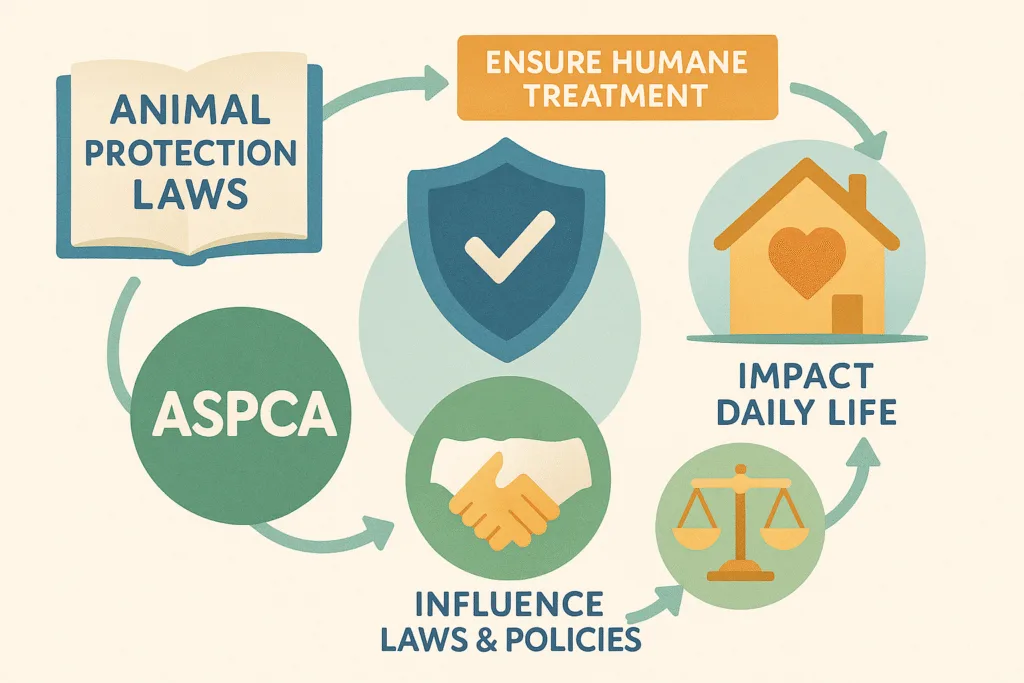
Animal protection laws are rules created to ensure animals are treated humanely. They define what counts as cruelty, establish safety standards, and provide legal tools to prevent abuse. The ASPCA plays a leading role in creating, supporting, and enforcing these laws across the U.S.
Many people aren’t aware of how deeply animal laws affect daily life—until they try to adopt a pet, move into a rental with an animal, or escape an unsafe situation while protecting their pet. These laws can determine whether pets stay with families or are given up. The ASPCA works to make those outcomes better—for animals and for people. They influence real legal changes that reduce abandonment, protect pet owners, and hold abusers accountable.
This guide explains how the ASPCA affects national and state-level legislation. You’ll learn about key policy wins, how these laws impact everyday people and animals, and the specific advocacy strategies used. We’ll also explore how you can get involved with these legal efforts, whether you’re a renter, a pet owner, or simply an animal advocate.

How the ASPCA Advances Animal Rights and Legal Protection
One powerful example is the ASPCA’s support for laws banning the sale of dogs, cats, and rabbits in pet stores. These laws disrupt puppy mills by removing a key market—and instead promote adoption from shelters. Another example is housing laws that prevent landlords from discriminating based on a pet’s breed or size. For renters, that can be the difference between keeping their beloved pet or being forced to surrender it.
They also advocate for laws that protect survivors of domestic violence. In many states, the ASPCA has helped pass legislation that funds pet-friendly domestic violence shelters. This addresses a heartbreaking barrier: over half of survivors delay leaving because they fear for their pet’s safety.
The ASPCA’s legal work has real-world results. Fewer animals are abandoned when renters are allowed to keep their pets. More survivors escape abuse when they can bring their animals with them. And more animals find homes when retail sales are replaced with shelter adoptions. These policies are not symbolic—they are rooted in daily decisions people face when laws either support or block animal welfare.
By focusing on laws that impact vulnerable animals and people, the ASPCA ensures that advocacy leads to action. Their team of attorneys, lobbyists, and local partners drafts bills, educates lawmakers, and mobilizes public support to pass stronger protections nationwide.
Here are three types of laws the ASPCA supports and how they make a difference:
- Retail Sale Bans
- These laws block pet stores from selling animals from commercial breeders (like puppy mills).
- They reduce the demand for mass-bred animals and shift public focus toward adoption.
- Tenant Protection Laws for Pet Owners
- These prevent discrimination based on pet breed, size, or species.
- They allow more families to stay together during moves or housing transitions.
- Domestic Violence Protections for Pet Owners
- Laws that fund shelters accepting pets mean survivors can leave abusive situations safely.
- They remove a key obstacle to seeking help and protect pets from retaliatory harm.
Support Laws That Protect Animals and Their People
Understanding the legal side of animal protection helps you become a more effective advocate. Start by visiting the ASPCA Advocacy Center where you can sign petitions, contact lawmakers, and support campaigns that make laws safer for animals. Your voice matters—and with just a few clicks, you can influence policy that protects pets across the country.